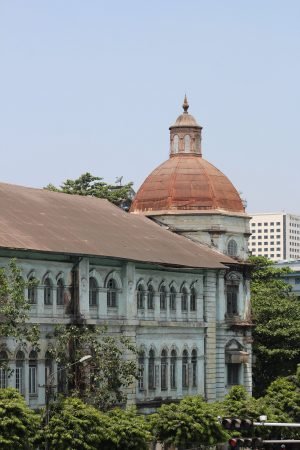Shortly after Myanmar’s military, or Tatmadaw, seized power in a coup at the start of the month, there was much discussion about the legality of the army’s seizure of power and abrogation of the result of national elections held in November. The question seemed pertinent insofar as the new junta and its leader, Sen. Gen. Min Aung Hlaing, claimed that the military takeover was carried out in conformity with – indeed, in defense of – the country’s 2008 Constitution.
The junta’s argument ran as follows: the election of November 8 was stained by large-scale voter fraud, which the Union Election Commission was unwilling to investigate, or actively colluded in. This threatened to destabilize the nation, necessitating the acting president to declare a state of emergency pursuant to Article 417 of the Constitution.
Under Article 418, legislative, executive, and judicial power was transferred to Commander-in-Chief Min Aung Hlaing for a period of one year, so that the claims of voter fraud could be properly investigated. “Unless this problem is resolved,” the military said in a statement shortly after the takeover, “it will obstruct the path to democracy and it must therefore be resolved according to the law.”
The coup was thus rendered as a necessary interregnum that would ultimately help preserve the constitutional order within which the limited political opening of the past decade has taken place. In order to safeguard Myanmar’s democracy, it was necessary to suspend it.
As many observers quickly pointed out, this argument was faulty on several grounds. The military provided no evidence of voter fraud, undercutting its claim that the country was threatened by “circumstances which may cause loss of sovereignty or disintegration of national solidarity,” as Article 417 of the Constitution requires.
Furthermore, the decision to declare a state of emergency was made not by President Win Myint, as required under Articles 417 and 418, but by a newly appointed vice president, retired general Myint Swe, after Win Myint had been detained and forced to relinquish his office. Thus, even if there had been legal grounds for the declaration of a state of emergency, it was declared unlawfully.
It’s reasonable to ask whether any of this matters. One can easily imagine a scenario in which the constitution was written in such a way that the current actions of the Tatmadaw were technically legal. That would do little to convince most international observers of the legitimacy of the coup, nor the millions of people who have poured into the streets to protest Myanmar’s lurch back to military rule.
To a great extent, the legality of the coup is beside the point. For most of Myanmar’s modern history, the law has been shaped by the military’s power and interests rather than the other way around. The Constitution, after all, was drafted by an unelected military junta and forced through a deeply flawed referendum in 2008, and preserves for the Tatmadaw a central place in Myanmar’s politics – including the power to take charge during states of emergency.
It is therefore a document that reflects the preferences of the military, rather than limiting them. As Melissa Crouch of the University of New South Wales, an expert on Myanmar’s Constitution, put it, “The Constitution matters, except when it applies to the military.”
Recent history shows that when the military’s interests change, the law tends to follow suit. This has been borne out by the tweaking and reshaping of laws since the coup. The new junta has introduced changes to the Penal Code and Code of Criminal Procedure, and proposed a new cyber security law that will tighten its control over the internet.
However, the legality of the coup is relevant in one important respect: the prospect that it could affect the outside world’s perceptions of the coup. Could a mirage of constitutionality offer Western governments a legalistic pretext for re-engagement, on the grounds that a return to the status quo ante is possible and desirable? At this stage, it seems that few Western governments have accepted the military’s tortured legal arguments, but in time, if economic sanctions and other diplomatic measures fail to weaken the army’s hold on power, it could conceivably play into the equation.
For now, the most pressing legal question is whether we will see amendments to the Constitution aimed at the retroactive confirmation of the military’s new position of control, if and when it stages a return to electoral politics.

































